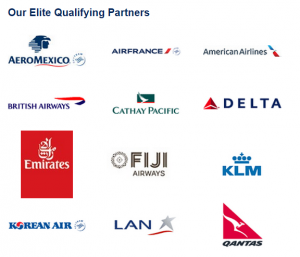It may not be big news, in fact, most of the folks I follow, feel it is a big “so what” in the airline partnership world. But Etihad has announced the Etihad Airways Partners, which initially starts with Etihad, Air Berlin, Jet Airways, Air Seychelles, Darwin Airlines, and Air Serbia.
What this may mean
Etihad has spent a lot of the past year or two buying interests in other airlines. That’s what Etihad Airways Partners represents, although not entirely, as Cranky Flyer illustrates. I’m not sure why Virgin Australia and Aer Lingus are left out, neither is Wandering Aramean. Its no surprise that a fourth alliance could till the proverbial soil of airline alliances, but I’m not sure that it is that meaningful. The details are fairly light, but even if this turns out to be similar to the other three alliances, I don’t believe it is a true game changer.
How this can be a game changer
I’m sure you guessed that this is what I was leading to. For me, the big deal is not what airlines Etihad has equity in. Yes, its a big deal that Etihad is spending all that money. But I think the potential is when Etihad is able to add other partners. They already do have non-equity partners. The list is long, it includes: Aegean Airlines, Air Astana, Air Baltic, Air Canada, Air Europa, Air France, Air Malta, Air New Zealand, Alitalia, All Nippon Airways, American Airlines, Bangkok Airways, Brussels Airlines, Czech Airlines, Etihad Regional, Flybe, Garuda, Jetblue, Kenya Airways, KLM, Korean Air, Malaysia Airlines, MEA, NIKI, Philippine Airlines, Royal Air Maroc, S7 Airlines, Safi Airways, SNCF, South African Airways, Sri Lankan Airlines, TAP Portugal, Turkish Airlines, Vietnam Airlines… Like I said, a long list–a really long list.
But what does this list really tell you? I don’t know, but I’ll tell you what it tells me: Etihad is working across alliances. If you look at that list above, you’ll see airlines that participate in Star Alliance, OneWorld, and SkyTeam. I think that is the important part. Etihad doesn’t care if airlines are in another alliance. That could ultimately lead to the end of conventional alliances. If you don’t believe me, look at another airline that is taking an unconventional approach – Alaska Airlines (albeit different approach than Etihad).
So What’s the Point?
My point is simple. The conventional alliance approach is dwindling. While we aren’t quite sure what the benefits of being an Etihad Airways Partner is, its becoming more clear that the three legacy airline alliances are coming under pressure. How will they (the legacy airline alliances) react to this? How will they create greater value for their member airlines? Further, how will Etihad create value for their Etihad Airways Partners? More to the point though, Airlines like Alaska Airlines have managed partnerships that span across the legacy alliances, and they seem to be working. So the question may be: What value is Alaska Airlines creating that legacy alliances aren’t? Or further, how can Alaska expand partnerships to create greater impact.
If you look at that graphic just above, you’ll see one airline that by all accounts, refuses to join alliances, but they are aligned with Alaska – and that airline is called Emirates. It’s the bucket list airline for miles and points junkies looking to shower at 40,000 feet. No other alliance has that, in fact, the only other airline I can think that is partnered with Emirates (in a meaningful way) is Korean Air.
What I’m getting at is this: Legacy Alliances may very well be on their way out. I don’t have insight into the business side, e.g. what benefits airlines get for being a member of the legacy alliances, vs. Etihad Airways Partners, vs. partnering with Alaska Airlines. I have to believe though that if we are seeing a movement toward partnerships outside of alliances, that there is enough value to make sense. What I predict is that we will see a continued movement beyond alliances. Will alliances go away? I don’t believe so, however, I think they will certainly lose influence.
So, what do you think?


Qantas has a pretty strong partnership with Emirates. All Qantas elites are recognised with Emirates and vice versa. Qantas passengers are using Dubai as a gateway to all European airports with QF only flying into London. QF passengers are on Emirates QF codeshare to all other European airports.
@Victor – Good point – that I think shows why the legacy Alliances may not be the way things go in the future. As I recall, QF used to have a nice partnership with BA that they kicked to the curb to make this Emirates one work.